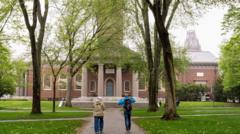This website uses cookies so that we can provide you with the best user experience possible. Cookie information is stored in your browser and performs functions such as recognising you when you return to our website and helping our team to understand which sections of the website you find most interesting and useful.


The Trump administration has moved to end Harvard's ability to enrol international students, escalating a standoff with America's oldest university.
Homeland Security Secretary Kristi Noem wrote on X that the administration had revoked Harvard's "Student and Exchange Visitor Program certification as a result of their failure to adhere to the law."
"Let this serve as a warning to all universities and academic institutions across the country," she posted on Thursday.
Harvard called the move "unlawful" in a statement.
"We are fully committed to maintaining Harvard's ability to host our international students and scholars, who hail from more than 140 countries and enrich the University – and this nation – immeasurably," the university responded.
"We are working quickly to provide guidance and support to members of our community. This retaliatory action threatens serious harm to the Harvard community and our country, and undermines Harvard's academic and research mission."
The Trump administration's decisions could affect thousands of international students who study at the university. Over 6,700 international students were enrolled at the institution last academic year, university data shows, making up 27% of its student body.
News quickly spread through the international community on campus Thursday, sparking fear and frustration among the thousands of students whose futures were suddenly in limbo.
"We're seeing a lot of confusion on this," Sarah Davis, an Australian student receiving a graduate degree, told BBC Newshour.
"The news has come only five days before a lot of us are due to graduate the university, and this obviously is going to have a lot of very uncertain implications for whether we're able to stay on in the United States afterwards and keep working here," said Ms Davis, who is president of the Australia and New Zealand Caucus at the Harvard Kennedy School.
"We're all just sitting back and waiting to see whether or not we get communications about what the next steps are from the university."
Leo Gerdén, a 32-year-old undergraduate from Sweden, remembers the day he received his admission letter to Harvard as the best day of his life. With less than a week until graduation, he didn't imagine his time at the prestigious campus ending like this.
"International students are being used as poker chips in a battle between the White House and Harvard," Mr Gerdén told the BBC. "It's incredibly dehumanising."
The administration has launched investigations into dozens of universities across the countries and wrung concessions from other major US institutions like Columbia University in New York.
But in April, Harvard University became the most prominent institution to push back, announcing it would sue the Trump administration after it sent the school a list of lengthy demands. The White House later said the list was sent by mistake.
It has demanded Harvard change its hiring, admissions and teaching practices to help fight antisemitism on campus. It has threatened to revoke the university's tax-exempt status and freeze billions of dollars in government grants.
Harvard earlier this year said it had taken many steps to address antisemitism, and that the government's demands were an effort to regulate the university's "intellectual conditions".
The standoff has continued to escalate.
In April, Noem threatened to revoke the university's access to student visa programmes if it did not comply with a sweeping records request from the administration, pertaining to international students.
In Thursday's letter, Noem said Harvard must comply with a list of demands to have an "opportunity" to regain its ability to enrol international students.
That included providing the government with all disciplinary records for non-immigrant students enrolled at Harvard over the past five years. Noem also demanded Harvard turn over electronic records, videos, or audio of "illegal" and "dangerous or violent" activity by non-immigrant students on campus.
The notice gave Harvard 72 hours to comply. In her post on X, Noem warned that the move should "serve as a warning to all universities and academic institutions across the country."
The Trump administration has attempted to curtail individual visas for international students, causing confusion on university campuses across the US and leading to a wave of lawsuits.
In some cases, those revocations appeared to affect foreign students who participated in political protests or have had previous criminal charges, such as driving infractions.
In a separate court case on Thursday, a federal judge in California blocked the Trump administration from cancelling the legal status of international students across the US while challenges to the policy play out in court.
"We came here because if what America stands for: freedom of speech, academic freedom, a vibrant intellectual community," Mr Gerdén said of his international classmates. "And now Trump is threatening all those values."
"Without the international students, Harvard is simply not Harvard anymore," he said.



 Africana55 Radio
Africana55 Radio 
